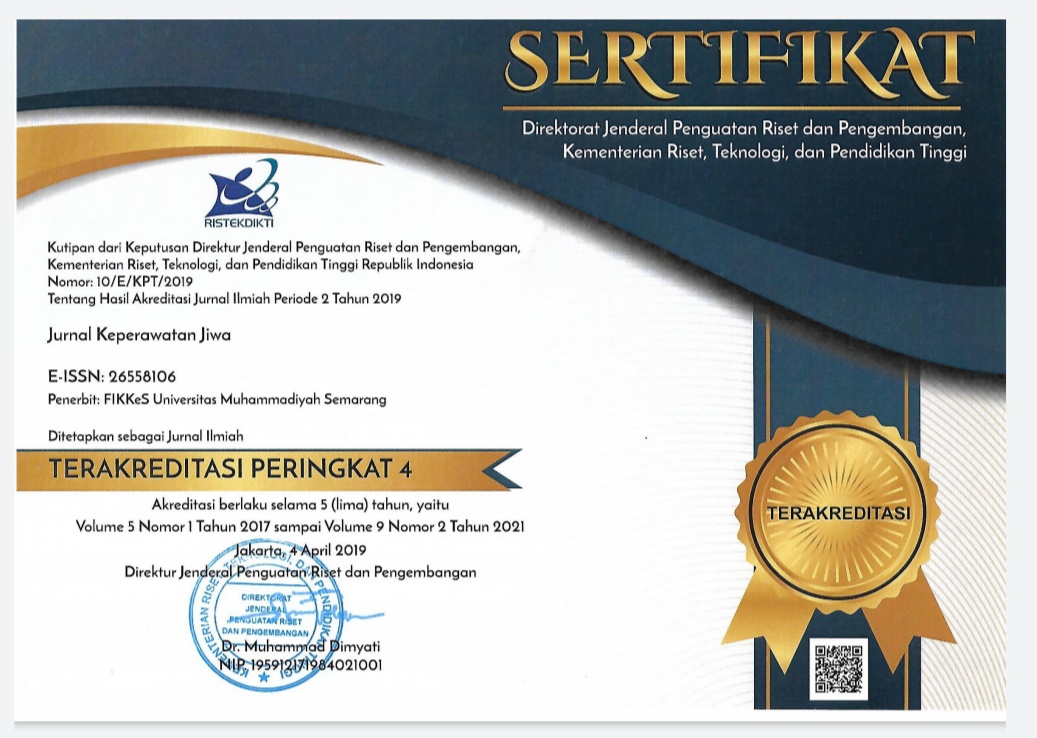Social Media and Mental Health Issue among Students during Pandemic Covid-19
(1) Universitas Nahdlatul Ulama Surabaya
(2) Universitas Nahdlatul Ulama Surabaya
(3) Universitas Muhammadiyah Gresik
(*) Corresponding Author
Abstract
Covid-19 pandemic makes students studying from home, most of all activity had been doing at home, it makes students having more time to access the social media to update information and to communicate with others. The aim of this research was to analyze the effect of social media to depression, anxiety and stress and self esteem among students. The population is nursing students and the research consist of 118 students, data taken through online system and using Depression Anxiety Stress Scale, Rosenberg Self Esteem and social media using scale. Data was analyzed by pearson correlation test, and the result showed that social media has effect to depression, anxiety and stress occurrence (p-value <0.05) and has no effect to self esteem (>0.05). Using social media have to having screen time to prevent psychosocial problems and social media addiction.
Keywords
Full Text:
PDFReferences
Aalbers, G., McNally, R. J., Heeren, A., de Wit, S., & Fried, E. I. (2019). Social media and depression symptoms: A network perspective. Journal of Experimental Psychology: General, 148(8), 1454–1462. https://doi.org/10.1037/xge0000528
Anderson, M., & Jiang, J. (2018). Teens, Social Media & Technology 2018. Pew Research, (May), 20. Retrieved from http://assets.pewresearch.org/wpcontent/uploads/sites/14/2018/05/31102617/PI_ 2018.05.31_TeensTech_FINAL.pdf
Andreassen, C. S., Pallesen, S., & Griffiths, M. D. (2017). The relationship between addictive use of social media, narcissism, and self-esteem: Findings from a large national survey. Addictive Behaviors, 64, 287–293. https://doi.org/10.1016/j.addbeh.2016.03.006
B, S., Fitriasari, A., & -, K. (2019). Penggunaan Media Sosial Terhadap Kejadian Depresi, Kecemasan Dan Stres Pada Mahasiswa. Bali Medika Jurnal, 6(2), 214–217. https://doi.org/10.36376/bmj.v6i2.87
Budury, S. (2020). Factor Associated with Covid-19 Guidelines Practice among Nursing Students. Jurnal Keperawatan, 12(4), 751–756. https://doi.org/https://doi.org/10.32583/keperawatan.v12i4.977
Cao, W., Fang, Z., Hou, G., Han, M., Xu, X., Dong, J., & Zheng, J. (2020). The psychological impact of the COVID-19 epidemic on college students in China. Psychiatry Research, 287. https://doi.org/10.1016/j.psychres.2020.112934
Gao, J., Zheng, P., Jia, Y., Chen, H., Mao, Y., Chen, S., … Dai, J. (2020). Mental health problems and social media exposure during COVID-19 outbreak. PLoS ONE, 15(4). https://doi.org/10.1371/journal.pone.0231924
Huaxia. (2020). Bat soup, Biolab, Crazy Numbers...Misinformation “Infodemic” on Novel Coronavirus Exposed. Www.Xinhuanet.Com. Retrieved from http://www.xinhuanet.com/english/2020-02/04/c_138755586.htm
Islam, S., Malik, M. I., Hussain, S., Thursamy, R., Shujahat, M., & Sajjad, M. (2018). Motives of excessive Internet use and its impact on the academic performance of business students in Pakistan. Journal of Substance Use, 23(1), 103–111. https://doi.org/10.1080/14659891.2017.1358305
Jun, S., & Choi, E. (2015). Academic stress and Internet addiction from general strain theory framework. Computers in Human Behavior, 49, 282–287. https://doi.org/10.1016/j.chb.2015.03.001
Kemp, S. (2020). Digital 2020: 3.8 billion people use social media - We Are Social UK - Global Socially-Led Creative Agency. Retrieved September 28, 2020, from https://wearesocial.com/uk/blog/2020/01/digital-2020-3-8-billion-people-use-social-media
Keyes, K. M., Gary, D., O’Malley, P. M., Hamilton, A., & Schulenberg, J. (2019). Recent increases in depressive symptoms among US adolescents: trends from 1991 to 2018. Social Psychiatry and Psychiatric Epidemiology, 54(8), 987–996. https://doi.org/10.1007/s00127-019-01697-8
Krasnova, H., Veltri, N. F., Eling, N., & Buxmann, P. (2017). Why men and women continue to use social networking sites: The role of gender differences. Journal of Strategic Information Systems, 26(4), 261–284. https://doi.org/10.1016/j.jsis.2017.01.004
Li, G., Hou, G., Yang, D., Jian, H., & Wang, W. (2019). Relationship between anxiety, depression, sex, obesity, and internet addiction in Chinese adolescents: A short-term longitudinal study. Addictive Behaviors, 90, 421–427. https://doi.org/10.1016/j.addbeh.2018.12.009
Mboya, I. B., Leyaro, B. J., Kongo, A., Mkombe, C., Kyando, E., & George, J. (2020). Internet addiction and associated factors among medical and allied health sciences students in northern Tanzania: A cross-sectional study. BMC Psychology, 8(1). https://doi.org/10.1186/s40359-020-00439-9
O’Reilly, M., Dogra, N., Whiteman, N., Hughes, J., Eruyar, S., & Reilly, P. (2018). Is social media bad for mental health and wellbeing? Exploring the perspectives of adolescents. Clinical Child Psychology and Psychiatry, 23(4), 601–613. https://doi.org/10.1177/1359104518775154
Statista. (2020). Breakdown of social media users by age and gender Indonesia 2020. Retrieved September 30, 2020, from https://www.statista.com/statistics/997297/indonesia-breakdown-social-media-users-age-gender/
Stockdale, L. A., & Coyne, S. M. (2020). Bored and online: Reasons for using social media, problematic social networking site use, and behavioral outcomes across the transition from adolescence to emerging adulthood. Journal of Adolescence, 79, 173–183. https://doi.org/10.1016/j.adolescence.2020.01.010
Zhong, B., Huang, Y., & Liu, Q. (2021). Mental health toll from the coronavirus: Social media usage reveals Wuhan residents’ depression and secondary trauma in the COVID-19 outbreak. Computers in Human Behavior, 114. https://doi.org/10.1016/j.chb.2020.106524
Article Metrics
Abstract view : 3056 timesPDF - 267 times
DOI: https://doi.org/10.26714/jkj.8.4.2020.551-556
Refbacks
- There are currently no refbacks.
PPNI Univ. Muhammadiyah Semarang
Jl. Kedungmundu Raya No. 18 Semarang Gedung NRC University of Muhammadiyah Semarang
Phone: 02476740287
Fax: 02476740287
Email: [email protected]
This work is licensed under a Creative Commons Attribution 4.0 International License.


